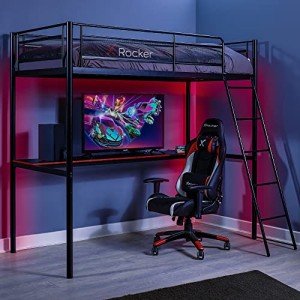
30
MayIt's Time To Forget Bunks: 10 Reasons Why You Don't Have It
Bunks: The Versatile Space-Saving Solution for Modern Living
In today's fast-paced world, where city home are shrinking and the demand for adaptability and usefulness is increasing, bunks have become a popular solution. Bunks are not simply a kind of bed; they represent a sophisticated approach to making the most of space, promoting social interaction, and offering comfortable sleeping plans. This short article will check out the different types of bunks readily available, their benefits, and how they can change both small and big living areas.
Understanding Bunks: What Are They?
Bunks, commonly referred to as bunk beds, are 2 or more beds stacked on top of each other. They are created to conserve flooring space, making them ideal for kids's rooms, hostels, and even adult living circumstances. Bunk beds are available in various designs and setups, from conventional models to modern, designer interpretations.
Types of Bunks
| Type of Bunk | Description |
|---|---|
| Twin-over-Twin | 2 twin beds bunk beds stacked on top of each other. Ideal for kids sharing a room. |
| Twin-over-Full | A twin bed on top and a bigger full bed on the bottom. Great for accommodating visitors. |
| Full-over-Full | 2 full-sized beds stacked together. Perfect for older children or adults. |
| L-Shaped Bunk Bed | Beds are arranged in an L shape, enabling a corner placement and included space below. |
| Loft Beds | Only the top bunk exists, leaving space for a desk, couch, or storage below. |
| Triple Bunk Beds | Three beds stacked vertically, exceptional for optimizing vertical space. |
Advantages of Using Bunks
Space Efficiency: Bunks are developed to use vertical space, making them perfect for little bed rooms or homes where floor space is restricted.
Economical: Investing in a bunk bed can be more cost-effective than purchasing multiple different beds, especially for growing families or those with regular visitors.
Flexible Designs: Many bunks come with add-ons, such as desks, storage drawers, or futons, enabling versatile usage of the location.
Social Interaction: Bunk beds welcome camaraderie amongst brother or sisters and good friends, cultivating a sense of connection.
Imaginative Use of Space: Bunk beds encourage imagination in room design, allowing for lively styles and vibrant decoration that can make a bedroom feel unique and welcoming.

Practical Considerations
Height Limitations: When picking a bunk bed, it is important to think about the height of the ceiling in the room. Measure the space to ensure there is sufficient clearance above the top bunk for safety and convenience.
Weight Restrictions: Each bunk has a particular weight limit. Parents must assess the weight of those using it, especially in the case of adults or much heavier adolescents sharing the bed.
Security Features: Features such as guardrails, tough ladders, and security accreditations are essential for making sure the bunk bed's security, especially for more youthful users.
Bunks for Various Living Situations
Household Homes
In household homes, bunks provide a useful solution for siblings sharing a room or accommodating pajama parties. Bunk beds can be stylishly integrated into a kid's space while supplying sufficient room for play.
Hostels and Vacation Rentals
For hostels and getaway leasings, bunk beds maximize sleeping arrangements without compromising convenience. Such setups use an affordable method to accommodate a bigger variety of guests.
College Dormitories
In college dorms, bunks help take advantage of the minimal square video readily available, enabling more room to interact socially and study.

Small Apartments
In little metropolitan apartment or condos, lofted bunk beds develop extra space for living locations, work spaces, or storage, making life more workable in compact environments.
Maintenance and Care of Bunks
Maintaining a bunk bed is important for ensuring its durability. Here are a couple of pointers:
Regular Inspections: Check for any loose screws or bolts and tighten them as necessary.
Cleanliness: Dust and clean the bunks frequently to avoid allergens and guarantee a tidy sleeping environment.
Bed mattress Care: Use a quality bed mattress protector to maintain health and extend the life of the mattress.
Age Appropriateness: Upgrade to a bigger, more sturdy bunk as children grow or when the existing arrangement no longer fulfills the requirements of its residents.
Regularly Asked Questions (FAQs)
1. Are bunk beds safe for kids?
Yes, bunk beds can be safe for kids if they are built with security features like guardrails and a steady ladder. Always monitor more youthful kids when they are using bunk beds.
2. What age is proper for a kid to sleep on the top bunk?
A lot of manufacturers advise that kids under the age of 6 must not sleep on the upper bunk due to security concerns.
3. How much weight can bunk beds normally hold?
Weight capabilities vary based on the style and materials but generally range from 200 to 400 pounds. Constantly inspect the manufacturer's guidelines.
4. Can bunk beds be separated into two single beds?
Lots of bunk beds are designed to be convertible, enabling them to be separated into 2 private beds. It's vital to inspect the product specifications before acquiring.
5. What type of bed mattress is best for a bunk bed?
A medium-firm mattress is typically suggested as it supplies appropriate support without being too heavy or soft, which can posture safety issues.
Bunks are more than just beds. They are ingenious space-saving solutions that accommodate the requirements of modern living. With various designs offered, they offer comfort and functionality for households, visitors, and individuals alike. By prioritizing safety and upkeep, owners can make sure that their bunk beds become a cherished part of their living spaces for several years to come. Whether for lively children or accommodating visitors, bunk beds offer a trendy and practical service to the challenge of minimal space.


Reviews